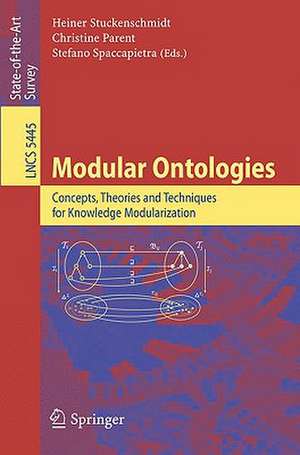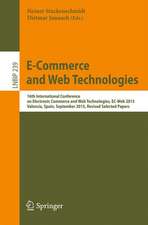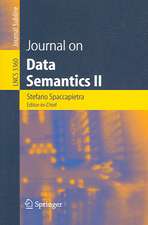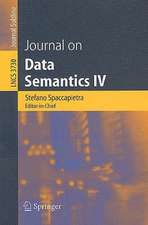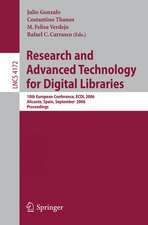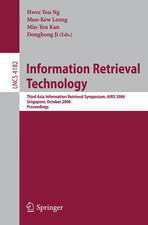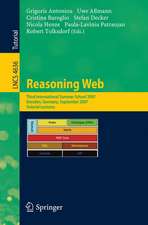Modular Ontologies: Concepts, Theories and Techniques for Knowledge Modularization: Lecture Notes in Computer Science, cartea 5445
Editat de Heiner Stuckenschmidt, Christine Parent, Stefano Spaccapietraen Limba Engleză Paperback – 25 mai 2009
Din seria Lecture Notes in Computer Science
- 20%
 Preț: 1061.55 lei
Preț: 1061.55 lei - 20%
 Preț: 307.71 lei
Preț: 307.71 lei - 20%
 Preț: 438.69 lei
Preț: 438.69 lei - 20%
 Preț: 579.30 lei
Preț: 579.30 lei -
 Preț: 410.88 lei
Preț: 410.88 lei - 17%
 Preț: 427.22 lei
Preț: 427.22 lei - 20%
 Preț: 596.46 lei
Preț: 596.46 lei - 15%
 Preț: 448.04 lei
Preț: 448.04 lei - 20%
 Preț: 353.50 lei
Preț: 353.50 lei -
 Preț: 389.49 lei
Preț: 389.49 lei - 20%
 Preț: 309.90 lei
Preț: 309.90 lei - 20%
 Preț: 645.28 lei
Preț: 645.28 lei - 20%
 Preț: 763.23 lei
Preț: 763.23 lei - 15%
 Preț: 580.46 lei
Preț: 580.46 lei - 20%
 Preț: 310.28 lei
Preț: 310.28 lei - 20%
 Preț: 655.02 lei
Preț: 655.02 lei - 20%
 Preț: 1183.14 lei
Preț: 1183.14 lei - 20%
 Preț: 340.32 lei
Preț: 340.32 lei -
 Preț: 449.57 lei
Preț: 449.57 lei - 20%
 Preț: 591.51 lei
Preț: 591.51 lei - 18%
 Preț: 938.83 lei
Preț: 938.83 lei - 20%
 Preț: 337.00 lei
Preț: 337.00 lei - 20%
 Preț: 649.50 lei
Preț: 649.50 lei - 20%
 Preț: 607.40 lei
Preț: 607.40 lei - 20%
 Preț: 1414.79 lei
Preț: 1414.79 lei - 20%
 Preț: 1024.44 lei
Preț: 1024.44 lei - 20%
 Preț: 583.40 lei
Preț: 583.40 lei - 20%
 Preț: 453.32 lei
Preț: 453.32 lei - 20%
 Preț: 575.49 lei
Preț: 575.49 lei - 20%
 Preț: 1075.26 lei
Preț: 1075.26 lei - 20%
 Preț: 585.88 lei
Preț: 585.88 lei - 20%
 Preț: 825.93 lei
Preț: 825.93 lei - 17%
 Preț: 360.20 lei
Preț: 360.20 lei - 20%
 Preț: 763.23 lei
Preț: 763.23 lei - 20%
 Preț: 340.32 lei
Preț: 340.32 lei - 20%
 Preț: 504.58 lei
Preț: 504.58 lei - 20%
 Preț: 369.13 lei
Preț: 369.13 lei - 20%
 Preț: 580.93 lei
Preț: 580.93 lei - 20%
 Preț: 343.62 lei
Preț: 343.62 lei - 20%
 Preț: 350.21 lei
Preț: 350.21 lei - 20%
 Preț: 583.40 lei
Preț: 583.40 lei - 20%
 Preț: 583.40 lei
Preț: 583.40 lei - 15%
 Preț: 438.59 lei
Preț: 438.59 lei - 20%
 Preț: 341.95 lei
Preț: 341.95 lei - 20%
 Preț: 238.01 lei
Preț: 238.01 lei - 20%
 Preț: 538.30 lei
Preț: 538.30 lei
Preț: 329.58 lei
Preț vechi: 411.98 lei
-20% Nou
Puncte Express: 494
Preț estimativ în valută:
63.07€ • 67.44$ • 52.58£
63.07€ • 67.44$ • 52.58£
Carte tipărită la comandă
Livrare economică 17 aprilie-01 mai
Preluare comenzi: 021 569.72.76
Specificații
ISBN-13: 9783642019067
ISBN-10: 3642019064
Pagini: 378
Ilustrații: X, 378 p.
Dimensiuni: 155 x 235 x 25 mm
Greutate: 0.34 kg
Ediția:2009
Editura: Springer Berlin, Heidelberg
Colecția Springer
Seriile Lecture Notes in Computer Science, Theoretical Computer Science and General Issues
Locul publicării:Berlin, Heidelberg, Germany
ISBN-10: 3642019064
Pagini: 378
Ilustrații: X, 378 p.
Dimensiuni: 155 x 235 x 25 mm
Greutate: 0.34 kg
Ediția:2009
Editura: Springer Berlin, Heidelberg
Colecția Springer
Seriile Lecture Notes in Computer Science, Theoretical Computer Science and General Issues
Locul publicării:Berlin, Heidelberg, Germany
Public țintă
ResearchCuprins
Modularization Approaches.- to Part I.- An Overview of Modularity.- Formal Properties of Modularisation.- Criteria and Evaluation for Ontology Modularization Techniques.- On Importing Knowledge from Ontologies..- Modularity in Databases.- Partitioning and Extraction of Modules.- to Part II.- Extracting Modules from Ontologies: A Logic-Based Approach.- Structure-Based Partitioning of Large Ontologies.- Web Ontology Segmentation: Extraction, Transformation, Evaluation.- Traversing Ontologies to Extract Views.- Connecting Existing Ontologies.- to Part III.- Formal and Conceptual Comparison of Ontology Mapping Languages.- Ontology Integration Using ?-Connections.- Composing Modular Ontologies with Distributed Description Logics.- Package-Based Description Logics.
Textul de pe ultima copertă
This book constitutes a collection of research achievements mature enough to provide a firm and reliable basis on modular ontologies. It gives the reader a detailed analysis of the state of the art of the research area and discusses the recent concepts, theories and techniques for knowledge modularization.
The 13 papers presented in this book were all carefully reviewed before publication. They have been organized in three parts: Part I gives a general introduction to the idea and issues characterizing modularization and offers an in-depth analysis of properties, criteria and knowledge import techniques for modularization. Part II describes four major research proposals for creating modules from an existing ontology either by partitioning an ontology into a collection of modules or by extracting one or more modules from the ontology. Part III reports on collaborative approaches where modules that pre-exist are linked together through mappings to form a virtual large ontology.
The 13 papers presented in this book were all carefully reviewed before publication. They have been organized in three parts: Part I gives a general introduction to the idea and issues characterizing modularization and offers an in-depth analysis of properties, criteria and knowledge import techniques for modularization. Part II describes four major research proposals for creating modules from an existing ontology either by partitioning an ontology into a collection of modules or by extracting one or more modules from the ontology. Part III reports on collaborative approaches where modules that pre-exist are linked together through mappings to form a virtual large ontology.
